Nemesis - Harry Hole 02 Read online
Page 42
Harry swallowed and tried to speak, but Raskol squeezed harder and it turned into a groan.
'Sun Tzu is absolutely clear on love and hatred, Spiuni. Both love and hatred win in wars. They're inseparable like Siamese twins. Rage and compassion are the losers.'
'Then we're both about to lose,' Harry groaned.
Raskol tightened his grip again. 'My Anna would never have chosen death.' His voice quivered. 'She loved life.'
Harry wheezed the words: 'Like - you - love - freedom?'
Raskol loosened his grip and with a whine Harry drank air down into his aching lungs. His heart hammered in his head, but the traffic noise outside returned.
'You made your choice,' Harry wheezed. 'You gave yourself up in order to do penance. Incomprehensible to others, but it was your decision. Anna did the same.'
Raskol pressed the bottle against Harry's neck as he tried to move. 'I had my reasons.'
'I know,' Harry said. 'Doing penance is almost as strong an instinct as taking revenge.'
Raskol didn't answer.
'Did you know Beate Lonn also made a decision? She realised nothing would bring her father back. There is no rage left. She asked me to pay her respects and tell you she forgives you.' A spike of glass scraped against his skin. It sounded like a fountain-pen nib writing on rough paper. Hesitantly writing the last word. Only the full stop was missing. Harry swallowed. 'Now it's your turn to choose,
Raskol.'
'Choose between what, Spiuni? Whether you live or die?'
Harry breathed in, trying to keep his panic at a distance. 'Whether you want to set Beate Lonn free or not. Whether you will tell her what happened on the day you shot her father. Whether you will set yourself free.'
'Me?' Raskol laughed his soft laughter.
'I've found him,' Harry said. 'That is, Beate Lonn found him.'
'Found whom?'
'He lives in Gothenburg.'
Raskol's laughter stopped abruptly.
'He's lived there for nineteen years,' Harry went on. 'Ever since he discovered you were Anna's real father.'
'You're lying,' Raskol yelled and raised the bottle over his head.
Harry felt his mouth go dry and closed his eyes. On opening them again, he saw Raskol's glassy eyes. They breathed in unison; their chests rose and fell together.
Raskol whispered. 'And . . . Maria?'
Harry had to try twice before he got a sound from his vocal cords. 'No one has heard from her. Someone told Stefan they'd seen her with an itinerant group in Normandy several years ago.'
'Stefan? Have you spoken to him?'
Harry nodded.
'Why did he want to speak to a Spiuni like you?'
Harry tried to shrug, but was unable to move. 'Ask him yourself... '
'Ask . . .' Raskol stared at Harry in disbelief.
'Simon went to fetch him yesterday. He's sitting in the caravan next door. The police have a couple of issues outstanding, but the officers have been warned not to touch him. He wants to talk to you. The rest is up to you.'
Harry put his hand between the bottle and his neck. Raskol made no attempt to stop him as he stood up. He only asked: 'Why have you done this, Spiuni?'
Harry shrugged. 'You made sure the judges in Moscow allowed Rakel to keep Oleg. I'm giving you a chance to hold onto the only person you have left.' He took the handcuffs out of his jacket pocket and put them on the table. 'Whatever you decide, I consider we're quits now.'
'Quits?'
'You saw to it that mine returned. I have done the same for you.'
'I hear what you say, Harry, but what does it mean?'
'It means I'm going to tell everything I know about Arne Albu's murder. And we'll be after you with everything we possess.'
Raskol raised an eyebrow. 'It would be easier for you if you let it drop, Spiuni. You know you won't get anything on me, so why try?'
'Because we're the police,' Harry said. 'And not giggling concubines.'
Raskol's eyes didn't let go. Then he made a brief bow.
Harry turned in the doorway. The thin man sat bent over the plastic table with the shadows hiding his face.
'You've got until midnight, Raskol. Then the officers will take you back.'
An ambulance siren cut through the traffic noise in Finnmarkgata, rose and sank as if seeking a pure tone.
47
Medea
Harry carefully pushed open the bedroom door. He thought he could still smell her perfume, but the fragrance was so diffuse he wasn't sure if it came from the room or his memory. The large bed in the middle of the room imposed like a Roman galley. He sat on the mattress, placed his fingers on the cold, white bedsheet, closed his eyes and felt it pitch and roll. A slow, heavy ground swell. Was it here - like this - Anna had waited for him that evening? An angry buzz. Harry looked at his watch. Seven sharp. It was Beate. Aune rang a few minutes later and his double chins were flushed as he came up the stairs. He said a breathless 'Hello' to Beate and all three of them went into the sitting room.
'So you can say who these three portraits represent?' Aune said. 'Arne Albu,' Beate said, pointing to the picture on the left. 'Harry in the middle and Alf Gunnerud on the right.' 'Impressive,' Aune said.
'Well,' Beate said. 'An ant can distinguish between millions of other ant faces in an anthill. Proportionate to body weight, it has a much larger fusiform gyrus than I have.'
'I'm afraid then my own is extremely under-developed,' Aune said. 'Can you see anything, Harry?'
'I can certainly see a little more than when Anna first showed me. Now I know it's these three who have been indicted, by her.' Harry motioned towards the female figure holding the three lamps. 'Nemesis, the goddess of justice and vengeance.'
'Which the Romans pinched off the Greeks,' Aune said. 'They kept the scales, changed the whip for a sword, bound her eyes and called her Justitia.' He went to the lamp. 'When, in 600 bc, they began to think the system of blood revenge didn't work and decided to exact revenge from the individual and make it a public affair, it was precisely this woman who became the symbol of the modern constitutional state.' He stroked the cold, bronze woman. 'Blind justice. Cold-blooded vengeance. Our civilisation rests in her hands. Isn't she beautiful?'
'As beautiful as an electric chair,' Harry said. 'Anna's revenge wasn't exactly cold-blooded.'
'It was both cold-blooded and hot-blooded,' Aune said. 'Premeditated and impassioned at the same time. She must have been very sensitive. Psychologically damaged of course, but then we all are. Basically, it is just a question of the degree of damage.'
'And how was Anna damaged?'
'I never met her, so it will have to be a pure guess.'
'Go on then,' Harry said.
'On the subject of ancient gods, I assume you have heard of Narkissos, the Greek god who became so enamoured of his own reflection that he couldn't tear himself away? Freud introduced the concept of a narcissist to psychology, a person with an exaggerated sense of uniqueness, obsessed by the dream of boundless success. For the narcissist the need for revenge against those who have affronted him or her is often greater than all other needs. It is called the "narcissist's rage". The American psychoanalyst Heinz Kohut has described how such a person would seek to avenge the affront -which may seem a mere bagatelle to us - with whatever means they have at their disposal. For instance, what would seem on the surface to be a standard rejection might result in the narcissist working tirelessly, with a compulsive determination, to redress the balance, causing death if necessary.'
'Death to whom?' Harry asked.
'To all.'
'That's insane,' Beate burst out.
'In fact, that's what I'm saying,' Aune said drily.
They went into the dining room. Aune tested one of the old, upright chairs at the long, narrow oak table. 'They don't make them like this any more.'
Beate groaned. 'But why should she take her own life . . . just to get even? There must be other ways.'
'Of course,' Aune s
aid. 'But suicide is often an act of revenge in itself. You want to inflict a sense of guilt on those who have failed you. Anna just ratcheted it up a few notches. Besides, there was every reason to suspect that she didn't want to live any longer. She was lonely, rejected by her lovers and her own family. She had failed as an artist and resorted to drugs, but that didn't help. She was, in sum, a deeply disappointed, unhappy person who chose premeditated suicide. And vengeance.'
'Without any moral scruples?' Harry asked.
'The morality angle is interesting, of course.' Aune crossed his arms. 'Our society imposes on us a moral duty to live and, hence, to condemn suicide. However, with her apparent admiration for antiquity, Anna may have found her prop in the Greek philosophers, who thought every person should choose for themselves when they die. Nietzsche also considered that the individual had a full moral right to take his own life. He used the word freitod or voluntary death.' Aune raised a pointed index finger. 'But she had to confront another moral dilemma. Revenge. Insofar as she professed to be a Christian, Christian ethics demand that you should not take revenge. The paradox is, naturally, that Christians worship a God who is the greatest avenger of them all. Defy him and you burn in eternal hell, an act of revenge which is completely out of proportion to the crime, almost a case for Amnesty International, if you ask me. And if—' 'Perhaps she just hated?'
Aune and Harry both turned towards Beate. She looked up at them in fear, as if the words had slipped out by mistake.
'Morality,' she whispered. 'Love of life. Love. And yet hatred is strongest.'
47
Phosphorescence
Harry stood by the open window listening to the distant ambulance siren slowly fading in the rumble of noise from the urban cauldron. The house Rakel had inherited from her father lay high above everything happening in the carpet of light he could glimpse between the tall pine trees in the garden. He liked to stand looking at the trees, wondering how long they had been there and feeling the thought calm him. And at the lights from the town so reminiscent of marine phosphorescence. He had seen it only once, one night when his grandfather had taken him out in a rowing boat to shine a light on the crabs by Svartholmen. It was only the one night, but he would never forget it. It was one of those things that become brighter and more real with every year that passes. Not everything is like that. How many nights had he spent with Anna? How many times had they set off in the Danish skipper's boat and sailed wherever their whim took them? He couldn't remember. Soon all the rest would be forgotten too. Sad? Yes. Sad and necessary.
Nevertheless, there were two Anna moments he knew would never quite be erased. Two almost identical images, both with her thick hair spread across the pillow like a black fan, eyes wide open and one hand clutching the white, white sheet. The difference was the other hand. In one image, her fingers were interlaced with his; in the other they held a pistol.
'Could you close the window?' Rakel said behind him. She was sitting on the sofa, her legs tucked beneath her, a glass of red wine in hand. Oleg had just gone to bed happy, after smashing Harry at Tetris for the first time, and Harry was frightened an era had just passed irrevocably.
The news had nothing new to say. Old refrains: the military crusade against the East, reprisals against the West. They had switched off the TV and put on the Stone Roses, which to Harry's surprise and joy had been in Rakel's record collection. Youth. That was a time when nothing pleased him more than to see arrogant English kids with guitars and attitude. Now he liked the Kings of Convenience because they sang with precision and sounded only a touch less stupid than Donovan. And the Stone Roses on low volume. Sad but true. Maybe necessary. Things went in circles. He closed the window and promised himself he would take Oleg out to an island and shine a torch on crabs as soon as the opportunity presented itself.
'Down, down, down,' mumbled the Stone Roses from the loudspeakers. Rakel bent forward and took a sip of wine. 'It's a story as old as the hills,' she whispered. 'Two brothers who love the same woman, the very recipe for a tragedy.'
They fell silent, entwined their fingers and listened to each other's breathing.
'Did you love her?' she asked.
Harry considered the question carefully before answering: 'I don't remember. It was a time in my life which was very . . . muddled.'
She stroked his chin. 'Do you know what I think is such an odd thought? This woman I have never seen or met entered your flat, walked around and saw the photo of the three of us in Frognerseteren on your mirror. Knowing she would spoil everything. And you two perhaps loved each other after all.'
'Mm. She had planned all the details long before she knew about you and Oleg. She got hold of Ali's signature this summer.'
'Imagine the trouble she must have had forging his signature, being left-handed.'
'I hadn't thought about that.' He twisted his head in her lap and looked up at her. 'Shall we talk about something else? What would you say if I rang my father and asked if we could use the house in Andalsnes next summer? The weather's usually crap, but there's a boat-house and my grandfather's rowing boat.'
Rakel laughed. Harry closed his eyes. He loved her laughter. If he was careful not to put a foot wrong, he thought, perhaps he might be allowed to listen to that laugh for a long time to come.
Harry awoke with a start. Scrambled up into a sitting position and gasped for breath. He had been dreaming, but he couldn't recall what. His heart was beating like a bass drum gone wild. Had he been under water in the swimming pool in Bangkok again? Or facing the killer in the suite at the SAS hotel? His head ached.
'What's the matter?' Rakel mumbled in the dark.
'Nothing,' Harry whispered. 'Go back to sleep.'
He got up, went to the bathroom and drank a glass of water. The drawn, ashen face in the mirror peered back at him. There was a gale blowing outside. The branches of the great oak in the garden scraped against the wall. Poked him in the shoulder. Tickled his neck and made the hairs stand on end. Harry filled his glass again and drank slowly. He remembered now. What he had been dreaming. A boy sitting on the school roof, dangling his legs. Who wouldn't go in to the lesson. Whose little brother wrote his essays. Who showed his brother's new love all the places they had played when they were young. Harry had dreamed a recipe for tragedy.
When he crept back under the duvet, Rakel was asleep. He stared at the ceiling and began to wait for first light.
The clock on the bedside table showed 05.03 when he could stand it no longer, got up, rang directory enquiries and wrote down Jean Hue's private telephone number.
48
Heinrich Schirmer
Beate awoke when the doorbell rang for the third time.
She rolled over and looked at the clock. A quarter past five. She lay wondering what the wisest move would be - tell him to go to hell or pretend she wasn't at home. Another ring, of a kind which made it clear he wasn't going to give up.
She sighed, got up and wrapped her dressing gown around her. She took the intercom phone.
'Yes?'
'Sorry to be stopping by so late, Beate. Or so early.'
'Go to hell, Tom.'
There was a long silence.
'This isn't Tom,' the voice said. 'It's me, Harry.'
Beate swore softly and pressed the open button.
'I couldn't lie awake any longer,' Harry said as he came in. 'It's about the Expeditor.'
He slumped on the sofa as Beate slipped into the bedroom.
'As I said, what you do with Waaler's none of my business . . .' he shouted towards the open bedroom door.
'As you said, it's none of your business,' she shouted back. 'And, besides, he's been suspended.'
'I know. I was called to appear at the SEFO tribunal to talk about my meeting with Alf Gunnerud.'
She reappeared wearing a white T-shirt and jeans and stood opposite him. Harry looked up at her.
'I meant suspended by me,' she said.
'Oh?'
'He's a bastard. That does
n't mean you can say what you like to whom you like, though.'
Harry tilted his head and screwed up one eye. 'Should I repeat?' she asked.
'No,' he said. 'I think I've got the message now. What about if it isn't just anyone, but a friend?'
'Coffee?' But Beate didn't quite make it to the kitchen before a blush suffused her face. Harry got to his feet and followed her. There was just one chair by the small table. On the wall was a rose-painted wooden plaque with an old Havamal poem:
At every door-way,
ere one enters,
one should spy round,
one should pry round
for uncertain is the witting
that there be no foeman sitting,
within, before one on the floor.
'There were two things Rakel said last night which made me think,' Harry said, leaning against the sink. 'The first was that two brothers loving the same woman was a recipe for tragedy. The second was that Anna must have had a hard time imitating Ali's signature as she was left-handed.'

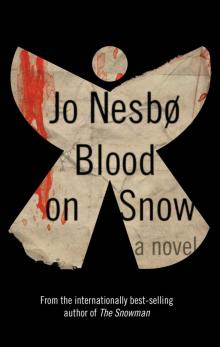 Blood on Snow: A novel
Blood on Snow: A novel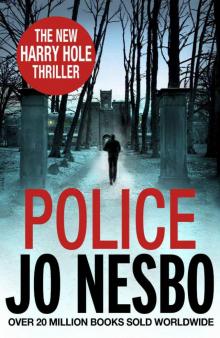 Police: A Harry Hole thriller (Oslo Sequence 8)
Police: A Harry Hole thriller (Oslo Sequence 8) Doctor Proctor's Fart Powder: The Great Gold Robbery
Doctor Proctor's Fart Powder: The Great Gold Robbery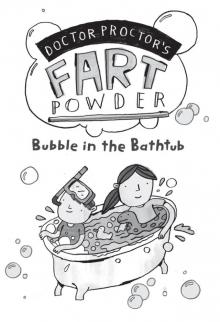 Bubble in the Bathtub
Bubble in the Bathtub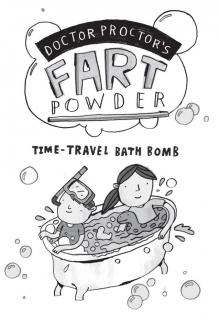 Doctor Proctor's Fart Powder: Time-Travel Bath Bomb
Doctor Proctor's Fart Powder: Time-Travel Bath Bomb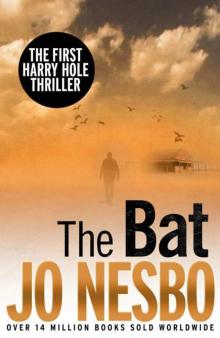 The Bat
The Bat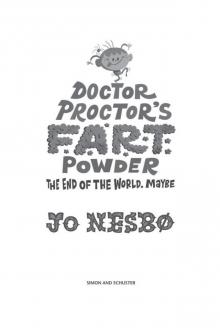 Doctor Proctor's Fart Powder: The End of the World. Maybe.
Doctor Proctor's Fart Powder: The End of the World. Maybe.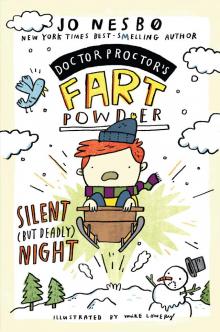 Silent (but Deadly) Night
Silent (but Deadly) Night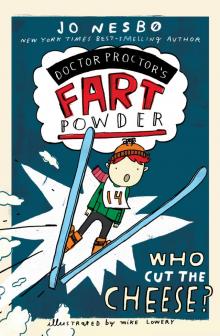 Who Cut the Cheese?
Who Cut the Cheese? Headhunters
Headhunters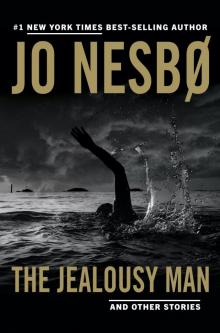 The Jealousy Man and Other Stories
The Jealousy Man and Other Stories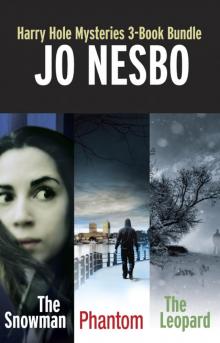 Harry Hole Mysteries 3-Book Bundle
Harry Hole Mysteries 3-Book Bundle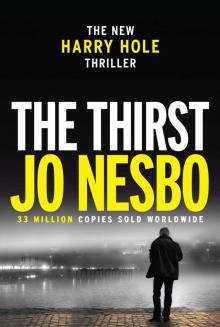 The Thirst
The Thirst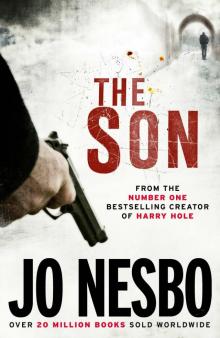 The Son
The Son The Redeemer
The Redeemer The Kingdom
The Kingdom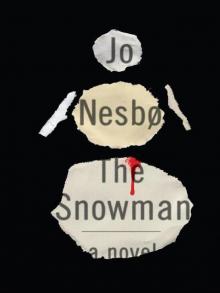 The Snowman
The Snowman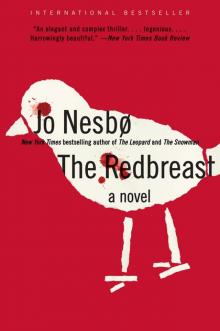 The Redbreast
The Redbreast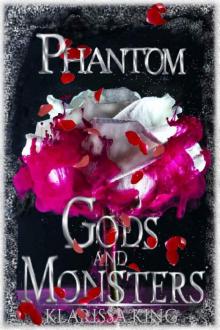 Phantom
Phantom Macbeth
Macbeth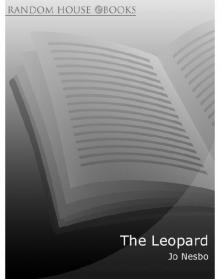 The Leopard
The Leopard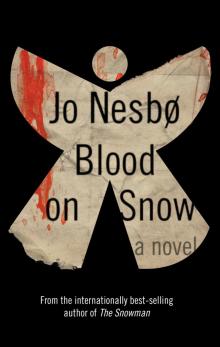 Blood on Snow
Blood on Snow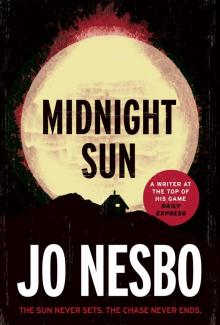 Midnight Sun
Midnight Sun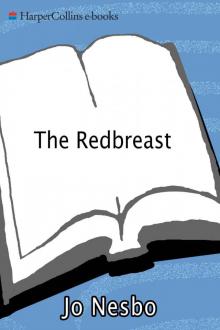 The Redbreast (Harry Hole)
The Redbreast (Harry Hole)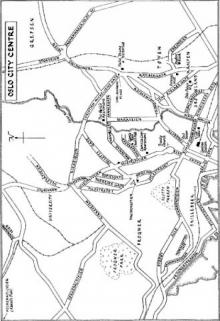 The Devil's Star
The Devil's Star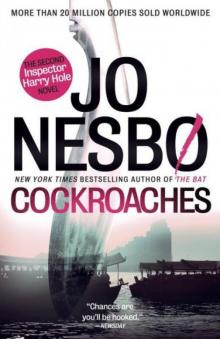 Cockroaches
Cockroaches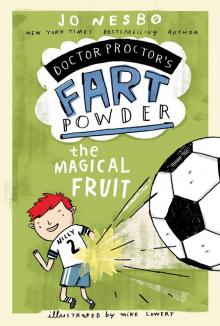 The Magical Fruit
The Magical Fruit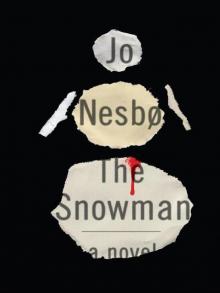 The Snowman: A Harry Hole Novel
The Snowman: A Harry Hole Novel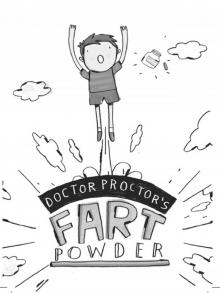 Doctor Proctor's Fart Powder
Doctor Proctor's Fart Powder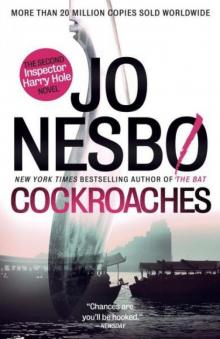 The Cockroaches
The Cockroaches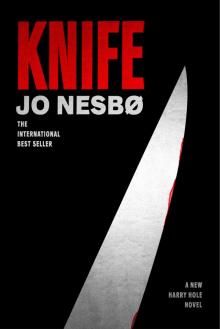 Knife
Knife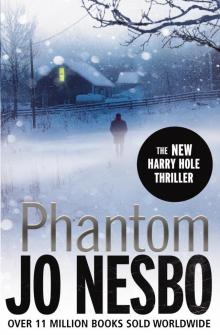 Phantom hh-9
Phantom hh-9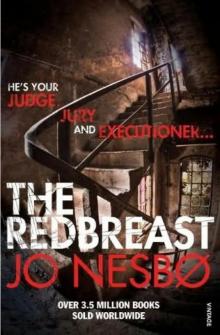 The Redbreast hh-3
The Redbreast hh-3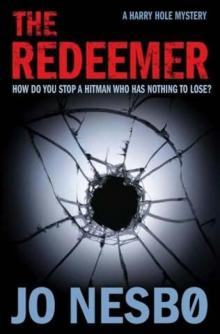 The Redeemer hh-6
The Redeemer hh-6 The Leopard hh-8
The Leopard hh-8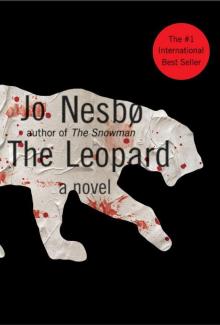 The Leopard: An Inspector Harry Hole Novel
The Leopard: An Inspector Harry Hole Novel The Great Gold Robbery
The Great Gold Robbery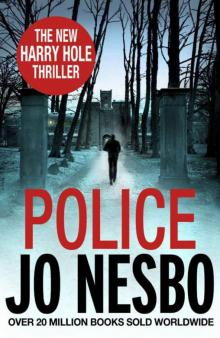 Police hh-10
Police hh-10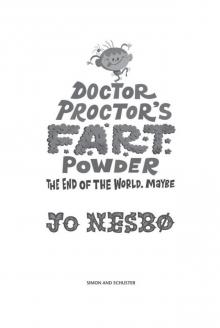 The End of the World. Maybe
The End of the World. Maybe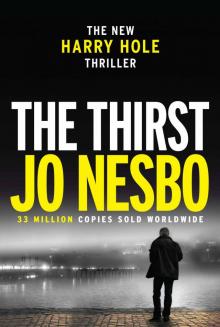 The Thirst: Harry Hole 11
The Thirst: Harry Hole 11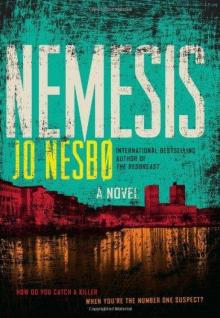 Nemesis - Harry Hole 02
Nemesis - Harry Hole 02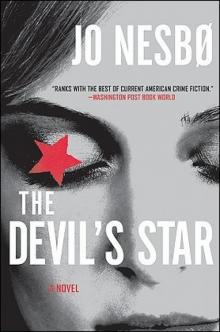 The Devil's star hh-5
The Devil's star hh-5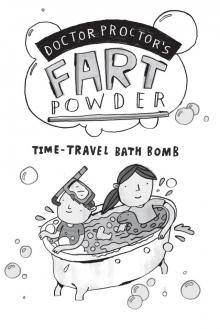 Time-Travel Bath Bomb
Time-Travel Bath Bomb